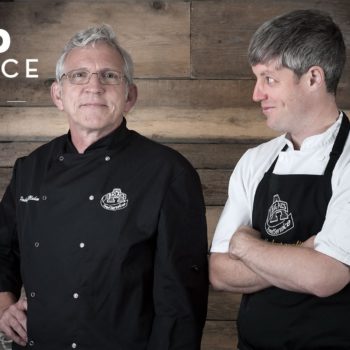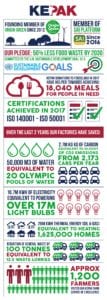Kepak publishes inaugural sustainability report

Kepak has published its first-ever sustainability report, in which it commits to halving food waste across its entire operation by 2030, and continuing to donate to surplus food charities like FoodCloud.
12 June 2018
Kepak Group has published its sustainability report, in which it details its ongoing efforts to reduce and eliminate food waste from all of its sites. The company’s pledge follows the company’s donations to surplus food charity FoodCloud; in 2017 it gave 8,200kg of surplus food to the charity, which provided more than 18,000 meals to people in need.
Meanwhile, Kepak’s efforts to streamline its production process to eliminate waste and emissions proceeded well in 2017. The company reducted its water usage to a volume roughly in line with 20 Olympic-size swimming pools (around 50m litres), and reduced its general waste by a massive 100 tonnes. It also eliminated 10 million kg of carbon and saved 10 million Kwh of electricity.
These results are found in Kepak’s first-ever sustainability report, which was published to coincide with European Sustainable Development Week 2018, which is an initiative to stimulate activities, projects and events promoting sustainable goals across the continent.
The contents of the report are outlined in this entertaining infographic (click to enlarge):
 Eimear Gallagher, Kepak Group’s environmental officer, said that the company recognises its position and responsibilities within the supply chain, and it had decided to act accordingly.
Eimear Gallagher, Kepak Group’s environmental officer, said that the company recognises its position and responsibilities within the supply chain, and it had decided to act accordingly.
“We have beeen working with our stakeholders to create a blueprint for achieving growth in a sustainable way,” says Gallagher. “As a business, we are fully committed to achieving our ambitious sustainability goals and we are very proud of what we have accomplished to date in this regard.
“The driving force behind Kepak’s sustainability plan is consistently seeking better ways to grow and improve our business in a manner that is respectful of our environment, our staff, our suppliers and our customers,” Gallagher added.
Future commitments
- To showcase Kepak Farm Centre of Excellence as a Knowledge Transfer Hub to disseminate technical and practical knowledge on Carbon Neutral farming, technology advancements and latest Research and Development
- To establish a Biodiversity plan for all sites and Kepak Farm by 2020
- To achieve BBFAW accreditation for all products
- Implementation of a standardised packaging procurement policy by 2020
- To deliver 100% Sustainable paper/board in its packaging by 2025
- To deliver 100% Recyclable or Compostable packaging by 2025
- To reduce Carbon Footprint of our Factories by 30% by 2030
- To rollout a standardised Energy Management System across all sites by 2025
- To reduce Water Usage across our factories by 20% by 2030
- 50% reduction in Food Waste across our factories by 2030 in line with UN SDG 12.3
- Deliver Packaging innovations to reduce the volume of food and packaging waste down its Supply Chain
- To review and improve the health & nutritional profile of our product portfolio



 Print
Print





Fans 0
Followers